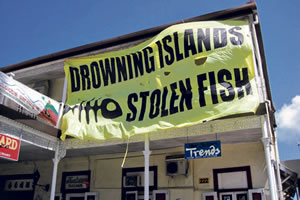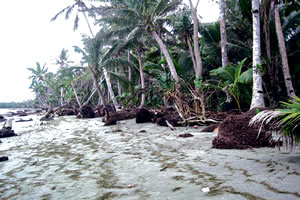Focusing on Climate Change

Teresa Tico. Photo By Amanda C. Gregg
Attorney-cinematographer Teresa Tico makes a film about the Miss South Pacific pageant that also dramatically shows how the contestants’ islands are being damaged by climate change
Kaua’i attorney/cinematographer Teresa Tico’s film covering the Miss South Pacific pageant is really a look at how climate change is impacting the contestants’ home islands
Kaua’i attorney Teresa Tico whose film Miss South Pacific: Beauty and the Sea debuts next week at the Hawaii International Film Festival is doing more than just moonlighting as a filmmaker.
The longtime ally of the environment has conveyed in this film the sobering, powerful reality of climate change and its effects from the perspectives of beauty queens representing 13 island nations.
The issue of climate change-induced water levels rising an estimated 3 feet by the end of this century is something that Tico says is too important and pressing to ignore.
“We are facing a future with climate refugees all over the planet,” she says.
Though climate change isn’t an easy topic to take on, Tico has never been one to shy away from daunting challenges. Named a Hawaii Super Lawyer Sept. 28 a designation that only goes to the top 5 percent of attorneys within the state Tico is perhaps best known as the attorney who took on former auto dealer mogul James Pflueger for both the Ka Loko Reservoir dam breach that killed seven people and the mudslide that destroyed Pila’a reef.

Miss Papua New Guinea Antonnia Singut performs at the pageant. Photos Courtesy Teresa Tico
Armed with an underwater camera, Tico captured footage at Pila’a that convinced authorities, including the EPA, to get involved. Citing the Ka Loko and Pila’a cases as the work of which she’s most proud, Tico says both brought awareness to the community at large.
“It set a lot of precedents on the environmental front,” Tico says, “and showed the adverse consequences of poor planning and permitted development.”
Those cases didn’t give Tico her first taste of the power of film, however. She started using video in cases in the 1980s, the first of which was against the state.
“It’s always difficult to sue the state and other government entities,” she says. “But using video footage has been effective in settling cases with them.”
Tico learned about what humans can do to nature at an early age.
“My dad Doug Tico was a surfer and lifeguard captain for Oceanside and Carlsbad,” she says. “We lived on the Oceanside Strand. Our lives revolved around the ocean I learned to swim before I walked, and learned to scuba at 6. When I was 12, the Oceanside Small Craft Harbor was built. The jetties interfered with the natural ebb and flow of sand, and before long the entire beach in front of the Strand disappeared. My parents and their friends talked about it, and at a young age I became angered by what I considered a crime against nature.”

Miss Tonga Paea Williams formerly danced for Tihati in Honolulu. Photos Courtesy Teresa Tico
Tico moved to Kaua’i soon after passing the bar in California in 1976. She is still an ocean lover, and has been a vegetarian for more than 20 years.
Protecting people and the environment has long been a passion for Tico, who attended law school at the University of San Diego in the ’70s. Recalling life as a law student during a “tumultuous time in our country’s political history,” she says human rights issues and the survival of fragile ecologies inspired her.
“We had just had a very large oil spill in Santa Barbara, and it made us all realize these oil rigs could have a huge impact on our marine environment, our beaches and all the ecosystems we rely on,” she says.
Tico decided to write her thesis on the adverse effect of oil.
“I focused on off-shore oil platforms and how to have them disassembled, and what laws existed to shut them down,” she says.
In those early days of being a lawyer, Tico knew cases couldn’t be won unless laws were changed. Thriving on the motivation to “see positive change,” she took on several environmental cases for free, something she did out of a desire to serve the community first before building her career.
“That’s something I’d encourage any young lawyer out there to do,” she says. “We now have more laws than we’ve ever had for environmental protection.”

Miss Samoa, Miss Fiji, Miss American Samoa, Miss Niue and Miss Cook Islands await the announcement of the new Miss South Pacific
Taking USC film classes on Maui in her spare time, Tico went on to become a certified Final Cut Pro editor in the mid’90s. She continued her studies commuting to Oahu for University of Hawaii outreach courses.
Miss South Pacific: Beauty and the Sea takes viewers to the South Pacific islands including Fiji and Papua New Guinea. Centered on the 2009 South Pacific beauty pageant themed “preserving our environment, the Pacific way,” the film delves into the problems caused by the carbon emissions of developed nations.
“There are already islands that can’t be located on satellite and are completely submerged,” Tico says.
The highlighted women in Tico’s film, including Fiji’s Merewalesi Nailatikalu, Tonga’s Paea Williams and Papua New Guinea’s Antonnia Singut, aren’t typical pageant queens, by Western standards, at least. Instead of trite generalizations or saccharine suggestions on how to better the world (e.g., “world peace”), they beg the audience to reduce global carbon emissions to save their island homes from drowning.
Tico says her inspiration for the film has been a long time coming, dating back to an “antibeauty pageant” she witnessed 20 years ago on a trip to the Cook Islands.
“We were amazed to see these beautiful indigenous women with tattooed bodies dancing and showcasing their beauty and talent,” she says. “They were so educated and so articulate and they did such a good job of representing their countries and their issues.”

The sign says it all at Greenpeace headquarters in Suva, Fiji
Choosing film instead of litigation to tackle the issue of climate change was in part because of the fleeting amount of time left to make a difference, she adds.
“You can show a film and people are motivated, and they get it,” she says. “These are issues I couldn’t ever address in a legal case.”
The reason is time.
“The wheels of justice turn slowly,” she says. “There is litigation directed at auto manufacturers because of emissions, at government for not enforcing environmental violations. But it’s going to be a long road.”
Already affected by climate change, the South Pacific Islands have been so severely eroded and flooded in low-lying areas that residents are having do deal with saltwater intrusion into the groundwater.
“As the sea rises, salt starts coming up through the ground, which kills crops and contaminates drinking water to the extent that entire villages have to be relocated,” Tico says.
The relocation of residents from low-lying atolls and islands in Papua New Guinea, for example a country so diverse it boasts 800 different languages isn’t simple: Evacuated villagers haven’t been welcomed by other islanders.
Pointing out these island nations are being ignored by the rest of the world, Tico hopes the documentary raises awareness on the issue. “It is something that impacts all of us,” she says.
So far the film has been accepted into 18 film festivals, including one in Hamburg, Germany. It also has won seven awards, including the Film Festival of Colorado Audience and Jury Awards for Best Environmental Film, and the Los Angeles Movie Awards for Excellence and Best Special Effects.

Because of higher sea levels, coconut trees are dying in Fiji
Of course, it’s not lost on Tico, who lives on the North Shore, that rising sea levels are already affecting Kaua’i.
“I see this when passing Waipa on my way to Ha’ena,” she says. “I filmed palm trees for my film about Antarctica’s melting ice shelves and half of them are gone now. I made that film only four years ago. It is happening rapidly, and every scientist I’ve talked to says the projections are being accelerated.”
Making a point to not only help protect the environment but also to get out and appreciate it, Tico, an avid windsurfer, says everyone can do something to help. “We can take personal responsibility for stepping more lightly on the planet,” she says. “If everybody did that, it would make a huge difference.”
Want to see Kaua’i filmmaker Teresa Tico’s Miss South Pacific: Beauty and the Sea? It will be screened at the Hawaii International Film Festival at 7 p.m. Oct. 19 at the Regal Dole Cannery Stadium on Oahu.



